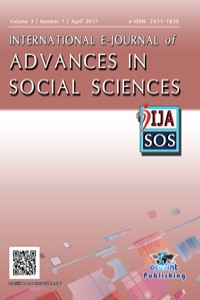Abstract
Logistics, which has been the sum of the responsibility that originates
from the resource assets, continues with the order of the customers and the
producer companies which supply the product during the time the customers use
the product. In conducting these
activities, the most effective way to succeed in logistics is to ensure that
correct product access is provided to the right customers. For the fact that
logistics is improving in the world, it is one of the sectors showing rapid
improvements in Turkey as well.
Turkey, due to its location, has political and economic advantages and
it is at a place where it provides continuity of world trade. It is obligatory
to use this strategic advantage and make commercial works. Looking from this
perspective, logistics activities, besides being just commercial acts in
Turkey, faced with the fact that they are activities that are also beneficial
for bringing more income for the state’s economy, should be spread to more
areas.
This study has been conducted to examine the current situation and
development of the logistics industry, in order to identify the problems of
firms in this sector and to assist in the significance of the sector by
developing solutions to these problems. In this context, logistics qualities
and importance of logistics, logistics management, the situation of logistic
activities in Turkey, Turkey's strengths and weaknesses in the logistics sector
have been discussed. In addition to that customer service problems, problems
encountered in transportation activities, storage problems, transportation and
packaging problems, problems in purchasing and customs liquidation activities
were examined. The research has been conducted by consulting 7 representatives
from the leading companies in Turkey’s logistics sector and it was conducted
with qualitative method.
According to the analysis of study, the results have been evaluated with
in the progress in logistics. The framework will help to increase the logistic
potential of Turkey by identifying the problems of the sector and eliminating
the deficiencies by developing solutions for these problems.
References
- Aydın, G.T., Öğüt, K.S. (2008a). What is a Logistic Village?. 2. Internation Railway Sempozium, Railway Convention Bulletin Book. 15-17 October 2008, p:1439-1448, İstanbul. Babacan, M. (2003). Development and Competitiveness Vision of the Logistics Sector in our Country. Ege Akademic Review, 3(12):10. Bilgin, N. (2006). Content Analysis Techniques and Case Studies in Social Sciences. Ankara: Siyasal Bookstore. Gültaş, P. and Yücel, M. (2015). Green Logistics: Green Transportation Services Malatya Metropolitan Municipality Example, Akademik Yaklaşımlar Magazine, 6 (2) p.70-83. Gür, S. (2009). Logistics Sector Problems and Solution Suggestions. Master Thesis, Gaziantep University Social Sciences Institute, Gaziantep. Gürdal, S. (2006). Turkey’s Logistics Sector Infrastructure Analysis. İTO Print No: 2006-14. Koban, E. and Keser, H. (2007). Logistics in Foreign Trade. 1.Edition, Ekin Publishing and Distribution, Bursa. Tanyaş, M. (2006). Strategy and Solution Proposals for the Turkish Logistics Sector. Atılım University, Ankara. Tanyaş, M. (2016). Logistics Villages-Centers, http://www.somutstrateji.com/lojistik-koylermerkezler/, (3.03.2016). Tuna, O. (2001). Logistics and Maritime Strategies for Turkey: International and Regional Identifiers. Dokuz Eylül University Social Sciences Institute Magazine, 3(2), 194-208, İzmir. Tutar, E., Tutar, F. and Yetişen, H. (2009). A Comparative Analysis of the Development Level of Logistics Sector in Turkey with Selected EU Countries (Romania and Hungary).KMU İBBF Magazine 11 (17), 190-216. Yıldırım, A. and Şimşek, H. (2008). Qualitative research methods in the social sciences. Seçkin Press, 7.Edition, Ankara.
Abstract
References
- Aydın, G.T., Öğüt, K.S. (2008a). What is a Logistic Village?. 2. Internation Railway Sempozium, Railway Convention Bulletin Book. 15-17 October 2008, p:1439-1448, İstanbul. Babacan, M. (2003). Development and Competitiveness Vision of the Logistics Sector in our Country. Ege Akademic Review, 3(12):10. Bilgin, N. (2006). Content Analysis Techniques and Case Studies in Social Sciences. Ankara: Siyasal Bookstore. Gültaş, P. and Yücel, M. (2015). Green Logistics: Green Transportation Services Malatya Metropolitan Municipality Example, Akademik Yaklaşımlar Magazine, 6 (2) p.70-83. Gür, S. (2009). Logistics Sector Problems and Solution Suggestions. Master Thesis, Gaziantep University Social Sciences Institute, Gaziantep. Gürdal, S. (2006). Turkey’s Logistics Sector Infrastructure Analysis. İTO Print No: 2006-14. Koban, E. and Keser, H. (2007). Logistics in Foreign Trade. 1.Edition, Ekin Publishing and Distribution, Bursa. Tanyaş, M. (2006). Strategy and Solution Proposals for the Turkish Logistics Sector. Atılım University, Ankara. Tanyaş, M. (2016). Logistics Villages-Centers, http://www.somutstrateji.com/lojistik-koylermerkezler/, (3.03.2016). Tuna, O. (2001). Logistics and Maritime Strategies for Turkey: International and Regional Identifiers. Dokuz Eylül University Social Sciences Institute Magazine, 3(2), 194-208, İzmir. Tutar, E., Tutar, F. and Yetişen, H. (2009). A Comparative Analysis of the Development Level of Logistics Sector in Turkey with Selected EU Countries (Romania and Hungary).KMU İBBF Magazine 11 (17), 190-216. Yıldırım, A. and Şimşek, H. (2008). Qualitative research methods in the social sciences. Seçkin Press, 7.Edition, Ankara.
Details
| Journal Section | Research Article |
|---|---|
| Authors | |
| Publication Date | April 30, 2017 |
| Submission Date | April 28, 2017 |
| Published in Issue | Year 2017 Volume: 3 Issue: 7 |
Contact: ijasosjournal@hotmail.com
The IJASOS Journal's site and its metadata are licensed under CC BY
Published and Sponsored by OCERINT International © 2015- 2025

